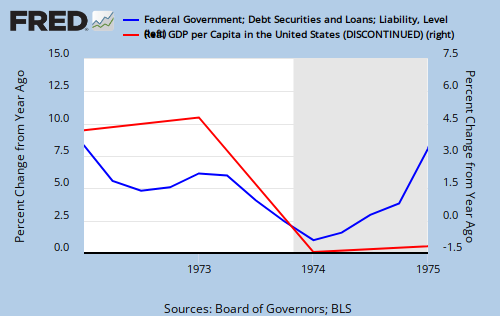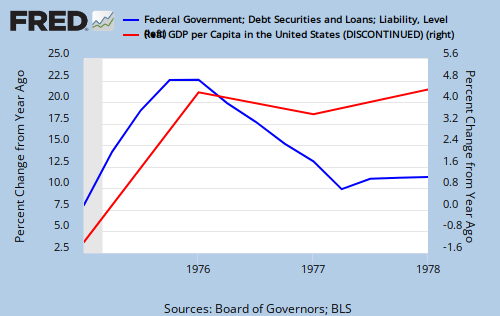Mitchell’s laws: Reduced money growth never stimulates economic growth. To survive long term, a monetarily non-sovereign government must have a positive balance of payments. Austerity breeds austerity and leads to civil disorder. Those, who do not understand the differences between Monetary Sovereignty and monetary non-sovereignty, do not understand economics.
==========================================================================================================================================
Changes in federal debt seem to foretell changes in per capita GDP.
The following chart depicts the entire period, from the time the U.S. became Monetarily Sovereign until the most recent data:

To get a closer look, I’ve divided the above chart into segments. Here’s 1972 – 1975:
Federal debt and real GDP per capita changes both peak in 1973.
Federal debt and real GDP per capita changes both trough in 1974

1975-1978:
Federal debt and real GDP per capita both peak in 1976

1980 – 1993:
Federal debt and real GDP per capita both peak in 1981.
Debt troughs in 1981; GDP troughs the next year, in 1982.
Debt peaks in 1983. GDP peaks the next year, in 1984.
Debt troughs in 1989; GDP troughs the next year, in 1990.

2000-2006:
Federal debt troughs in 2000; real GDP per capita changes trough the next year, in 2001.
Federal debt and real GDP per capita changes both peak in 2004

2007 – 2010:
Debt troughs in 2007; GDP per capita troughs in 2009
Debt peaks in 2009 then drops precipitously; GDP per capita rises in 2010.

GDP per capita data is not yet available for 2011, but total GDP direction may give us a hint, as it peaks in 2010:

In summary, changes in federal debt correspond with, or closely precede the same changes in per capita GDP. What does that tell you about the “super” committee’s efforts to reduce federal deficit spending?
(See a related post at “Oh, you want to cure unemployment?“)
Rodger Malcolm Mitchell
http://www.rodgermitchell.com
![]()
==========================================================================================================================================
No nation can tax itself into prosperity, nor grow without money growth. Monetary Sovereignty: Cutting federal deficits to grow the economy is like applying leeches to cure anemia. The key equation in economics: Federal Deficits – Net Imports = Net Private Savings
MONETARY SOVEREIGNTY
re: MMT not a theory – why not MMTruth?
[I didn’t like where MMFact would go]
LikeLike
Or . . . “Monetary Sovereignty,” which really is the basis for currently understood economics.
LikeLike
MS?
LikeLike
Good charts!
Why is the Tea Party always talking about cutting spending?
I thought the Boston Tea Party was about cutting taxes.
LikeLike
TEA stands for Taxed Enough Already. They want lower taxes, but they don’t believe that is wise at current spending levels, so lower spending is a prerequisite for what they really want.
LikeLike
Again, the expanded charts tell a more compelling story.
What about inverting the yield curve? They say every time the Fed does that, a recession follows. They did it in 1999-2000, and in 2006. Is that a causal relationship in any way? I know you say that inflation can be controlled by raising interest rates, and I figure that happens by increasing saving and decreasing spending (in the non-government sector), which would reduce aggregate demand. If they overdo it (which they always do, not understanding that there is a lag between their action and the economy’s reaction), would that not cause a recession?
Is the raising of interest rates coincident with decreasing deficits because they are both part of a coordinated (maybe too optimistic a word) policy to fight inflation?
Or is the decreasing deficit itself simply the result of the action of automatic stabilizers in response to economic growth? If so, then I guess you feel it is an over-reaction. How do we mitigate it?
LikeLike
Rodger,
Thanks for continuing to fight the good fight. It’s amazing to visit left-wing blogs and see how misinformed people are. They really think raising taxes on the rich will not harm the economy. When one tries to tell them otherwise, he is dismissed as a right-winger.
LikeLike